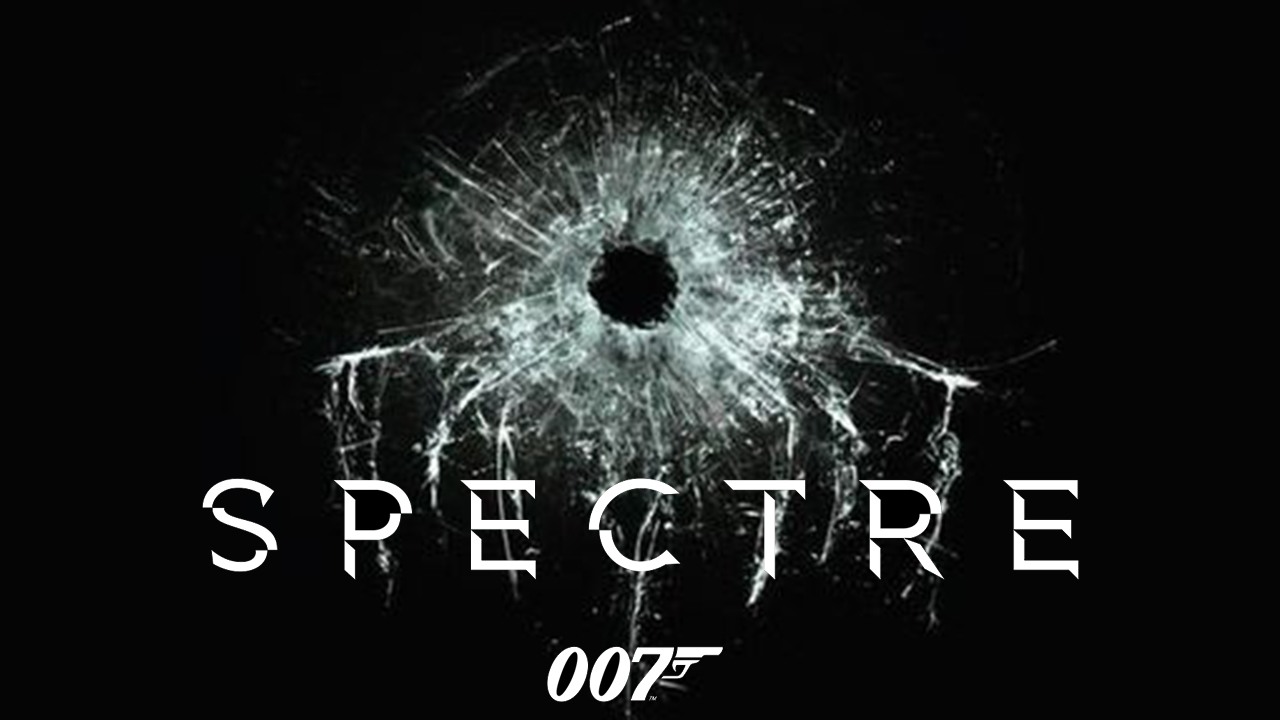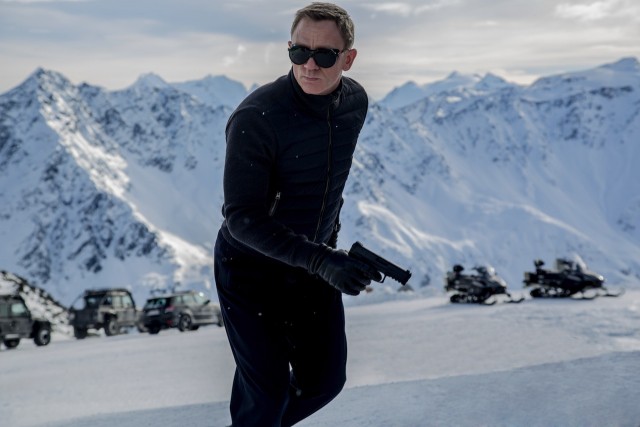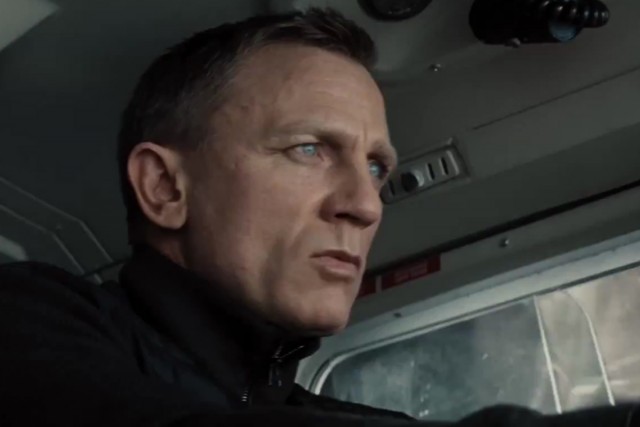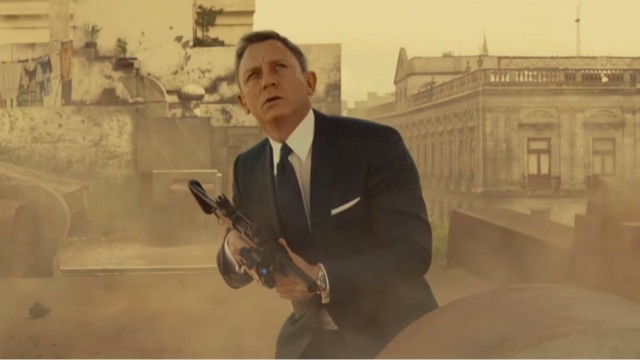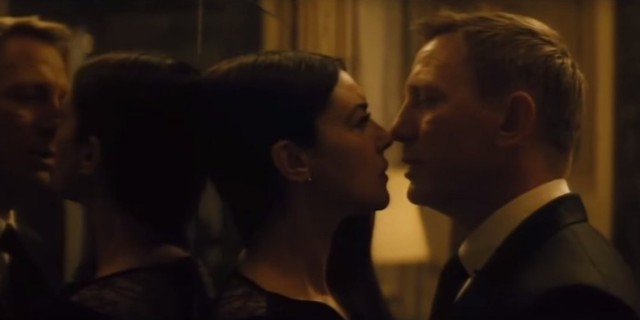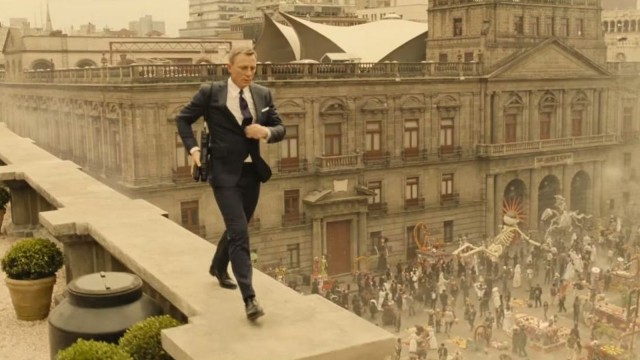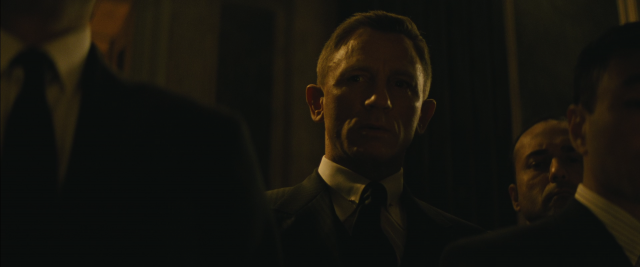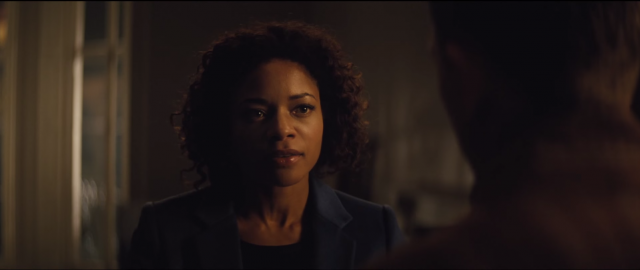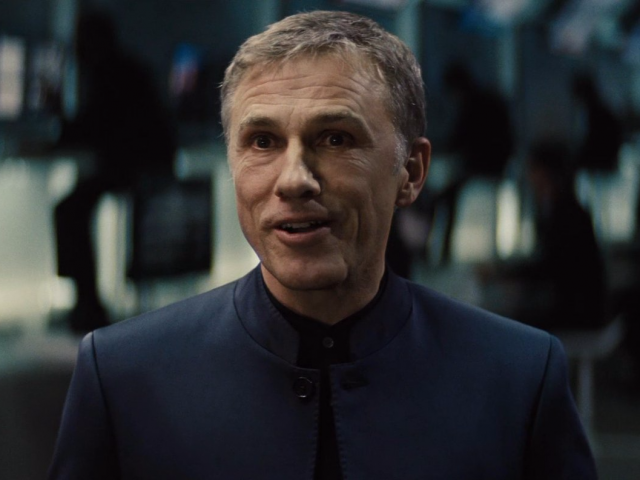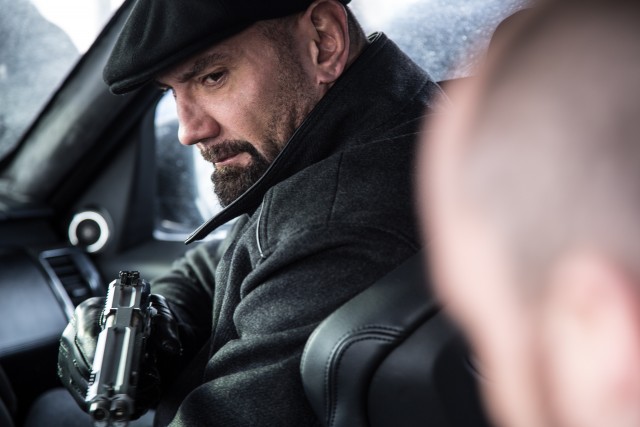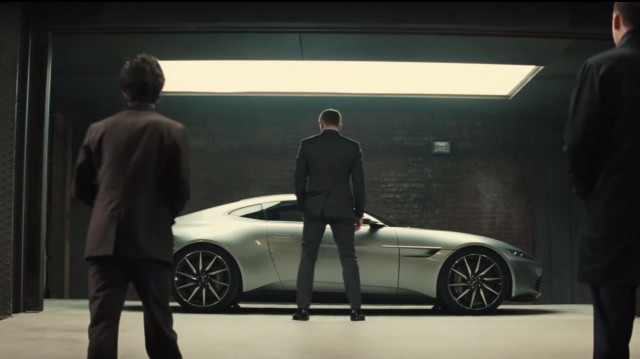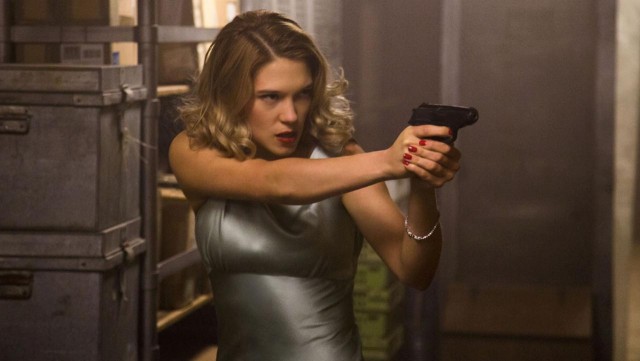Nothing defines classic Bond villains quite like SPECTRE, the Special Executive for Counter-Intelligence, Terrorism, Revenge, and Extortion. Originally the foes for most of Sean Connery’s run as classic superspy, James Bond, SPECTRE is coming back for the modern era, and the latest Bond flick wants you to know it, as the very title of the movie is simply, Spectre. That’s really all a Bond fan needs to know about when it comes to what makes this latest movie so appealing.
If you’re not among the longtime Bond fanbase however, Spectre still provides a solid guided tour of what makes this organization such a big deal, particularly now that the rebooted Daniel Craig movie timeline has re-positioned SPECTRE as having a key personal connection to Bond and his upbringing. The mystery has an interesting payoff, even if it’s not quite an earth-shattering one. We don’t want to get in the way of all of the exotic locales, spectacular action and sexy damsels that always defined the classic Bond movies especially, after all.
In fact, more than anything else, Spectre really feels like a love letter to what defined Bond’s classic run. Director, Sam Mendes has condensed his inspiration behind the franchise’s previous movie, 2012’s thoroughly excellent Skyfall, and has focused it specifically on Bond’s roots, rather than his evolution. This can sometimes lead to a movie that feels more reliably perfunctory than truly groundbreaking for Bond movie standards, and there’s no denying that Skyfall was always going to be a tough act to follow, regardless of whatever form its successor movie took.
Perhaps it’s the ideal time to re-introduce SPECTRE then, since that’s the only thing that’s going to turn heads in the wake of Skyfall. As the foundation for a modernization of classic Bond convention on this note, Spectre is exciting and highly entertaining to watch, even if it surprisingly lacks the emotional punch of Skyfall or Casino Royale, despite all of the prodding at Bond’s hidden past. As a potential climax to Daniel Craig’s run as Bond, the movie excels, especially with how well it ties all four of Craig’s movies together, though if you’re expecting a movie that truly pushes the Bond franchise forward like Skyfall did, well, you’re obviously not going to get that, since Spectre is clearly far more interested in revisiting days gone by for these movies.
Daniel Craig’s rough, raw Bond portrayal is as appealing as ever in Spectre, and the increased emphasis on past Bond convention means that Craig’s Bond feels just a bit less edgy this time out, if you happen to prefer your Bond more fantastical and flawless. Craig hasn’t lost a step at all when it comes to the many superb action scenes throughout Spectre, but as much as those have become more demanding than ever, the movie’s script at least allows him to embrace Bond as we’ve come to know him in incarnations past more, which generally leads to a Bond that is more suave and confident after his challenging, violent origins, rather than still an arrogant and unstable hothead.
This isn’t to say that Bond is never emotionally tested in Spectre however, though the peeks into his past are just that, peeks, and they certainly leave most of 007’s origin to the viewer’s imagination, as usual. More than ever though, Bond has a personal connection to his mission, and to his villain, probably the most since his new wife was tragically gunned down in 1969’s On Her Majesty’s Secret Service. That’s why it’s surprising that Craig’s Bond feels like he was more emotionally pushed in the previous movies, despite having to confront someone that helped to define him in such a big way in this movie.
It could be said that this is where Spectre somewhat falters. It doesn’t completely sell the idea that Bond is going to be broken down by this unstoppable, well, spectre of his past. Ultimately, our big bad is just another criminal super-villain, albeit one on a larger scale this time. It’s a scale appropriate for villains with the legacy of an organization like SPECTRE, but these new bad guys feel more like they’re emphasizing scope over drama.
At the very least though, Christoph Waltz is perfectly cast as our lead villain, Franz Oberhauser. As the leader of SPECTRE, Oberhauser is a shadow that consistently looms over Bond, seeming to have his metaphorical tentacles in any global intelligence outfit you can name, including the previous antagonists of Craig’s run as Bond. Like I said, it’s scale over drama, and despite Waltz’s fun performance as Oberhauser, he doesn’t quite register on the same impactful level as Raoul Silva from Skyfall for example, who is far and away the best of Craig’s villains at this point. Even Le Chiffre from Casino Royale felt like he ultimately made more of an impact than Oberhauser sadly does. Oberhauser certainly isn’t a bad villain, but he’s less remarkable than you would think, even if his re-invention as the SPECTRE leader is an effectively ominous and scary one.
As for our Bond girl in Spectre, we have Dr. Madeleine Swann, an esteemed psychologist with her own connection to SPECTRE. Lea Seydoux is another shining gem in one of the best casts of any of Craig’s Bond movies to date, and her steely, yet sweet disposition as Dr. Swann makes her a fun and sexy companion to Bond in this offering. She’s a more by-the-book Bond girl, in the sense that she’s not quite as subversive as Craig’s previous run of Bond girls were, but she also feels like a neat amalgam of several classic Bond girls, incorporating elements from Pussy Galore, Melina Havelock, Holly Goodhead, and Theresa Bond all at once. A pessimist could say that the franchise is dumbing down its women again, but even if Dr. Swann’s personality does sometimes jump around to an unwelcome extent, I’d prefer to think of it as another way for the movie to shift is priorities back to the raw extravagance and sex appeal of the classic Bond movies. Maybe Dr. Swann’s character ended up suffering in translation, but at least she’s still entertaining, especially when Lea Seydoux plays her so well.
Monica Belucci also shows up as another Bond girl, another inspired choice amongst exotic European actresses to fill those parts, though her role in the movie is surprisingly small. She shows up in the first act to first put Bond on the trail of SPECTRE, and the movie pretty much drops her after that. It’s not the first time that the franchise has featured two main Bond girls, only to inevitably drop one in favour of the other, but Belucci’s character simply vanishes with disappointingly little fanfare. It makes you wonder why the movie even sought out someone of Belucci’s pedigree, beyond adding another name to the cast.
Fortunately, another big name of late, Guardians of the Galaxy’s Dave Bautista, fares far better as Mr. Hinx, even surpassing Oberhauser in terms of appeal at times. Hinx is a callback to classic Bond henchmen like Jaws and Oddjob, being a mute, hulking bruiser that has one line in the entire movie (it’s actually just one word), and simply exists as a physical manifestation of the brutal might of SPECTRE, always seeming to stalk Bond to the ends of the Earth. Even with only one line, Bautista feels like one of the more enjoyable actors in the movie, selling his mighty presence with a surprising amount of charisma, even if he’s yet another personality that feels happy to stay in the shadow of his more memorable inspirations from the classic Bond movies in the end.
In fact, that’s often the problem with Spectre as a whole; It’s so determined to celebrate classic Bond with its personalities, that it sometimes ends up too content to sit in the shadow of its inspirations, beyond all of that slick modern production value anyway. The main force in the movie that actually does continue to feel modern and subversive is the presence of MI6’s returning regulars, who were all introduced in Skyfall, between Ralph Fiennes’ M, Ben Whishaw’s Q, and Naomie Harris’ Moneypenny. The three surprisingly feature in one of the movie’s best subplots, giving them a more active role in the storyline, as they must fight a new security measure being pushed by Andrew Scott’s Max Denbigh (whom 007 decides to rename “C”), which is threatening to permanently shut down the 00 program. The result of Max’s agenda is a bit predictable, but seeing how M, Q and Moneypenny all work together to prove their relevance and strike back at the misguided future of espionage feels like the most welcome callback to Skyfall that Spectre offers.
In a way, it feels like the Bond franchise wants to relax and just have some fun with its latest offering, after working so hard to bring the Bond movies into the 21st Century with Casino Royale and Skyfall most notably. That’s fair enough, though this more nostalgic, conservative direction sometimes works to undermine the otherwise enormous scale of the story, as the more old-school style of characterization sometimes feels at odds with a movie that wants to otherwise be so imposing and impressive in its sheer scope.
Spectre aims to distill the fundamentals of classic Bond into a rich, modern package. Unlike the deep and dramatic Skyfall, the movie is more exclusively about going bigger and more explosive, applying modern technology to the filmmaking constraints that older Bond movies would have had to make do with, when Bond was first up against SPECTRE in the 1960’s, back when Sean Connery and George Lazenby inhabited the iconic role.
When it comes down to it, Spectre isn’t anything that Bond fans wouldn’t have seen before, even if it’s still undeniably cool to view the classic Bond formula through a modern 21st Century lens. Newcomers can still enjoy a more purely action-packed and enormous Bond movie than most of Daniel Craig’s prior Bond offerings, and leave it at that, with no knowledge of SPECTRE’s 1960’s heyday necessary, though it’s nostalgic Bond fans that will probably get the most out of this latest movie, especially when Spectre seems to be so clearly made for them most of all.
That said, the concept behind the movie is great, even if it doesn’t really carry many surprises in the end. The idea of tying Bond more personally to SPECTRE in the rebooted timeline isn’t a bad one, and in the first act, the mystery of SPECTRE feels genuinely compelling, as the movie gradually unravels the true reach of a seemingly unstoppable society of manipulators, liars and killers. At first, it’s a welcome return to the feeling that this more raw Bond is yet again in over his head, though ultimately, Spectre wimps out of truly testing him, sadly, with a clean, consequence-free conclusion that feels true to classic Bond movies, but somewhat betrays the more grounded direction of the modern, rebooted movies that Daniel Craig has so far exclusively headlined.
For a story that presents itself in such a larger-than-life way, there’s disappointingly little to say about Spectre, which feels like it wants to hit a checklist of Bond tropes, rather than truly forge new ground. Then again, if you’re coming for the action-packed fisticuffs, fast cars and beautiful women, Spectre will still satisfy you, and the movie certainly isn’t wanting for entertainment value regardless of your history with the older Bond movies, if any, even if it’s not providing quite as much substance as the franchise has often done in recent years.
Blofeld’s fluffy white cat even makes a cameo in the movie, skulking around the room and jumping on Bond’s lab as he’s detained and about to be tortured. I’m not kidding! It’s so silly that it’s brilliant! This will really give you a sense of how proudly Spectre embraces the style of classic Bond, even to a fault at times.
Sam Mendes returns to direct Spectre, after doing a sublime job helming the franchise’s previous movie, Skyfall. After the demands of Skyfall, Mendes thankfully had one more Bond movie left in him in the end, and it seems like his idea of expanding upon Skyfall is to continue proving why old-school heroes like Bond are still necessary in the modern era, by proving that the most classic fundamentals of Bond’s oldest movies can still work in the modern era with Spectre.
The result is a movie that feels less meaty from a narrative standpoint compared to its predecessor, but no less impressive in terms of the polish. Spectre is a big movie that will easily floor both non-fans and die-hard fans of Bond in terms of the presentation, which Mendes still expertly directs with a huge sense of justified grandeur. The action scenes are a particular treat, being as jaw-dropping and intense as ever, whether it’s a close-quarters fistfight with Mr. Hinx, or a speedy chase that will leave some damage in a beautiful, exotic location. The movie opens especially strongly with a fantastic Mexican sequence set against the backdrop of the Festival de la Muerte, and the movie’s climax feels equally grand and memorable, as it effectively explores the legacy of Craig’s Bond run to chilling effect.
The middle portion of Spectre is sometimes more uneven, taking Bond from location to location, but only truly raising the bar when it delivers an action scene. There’s clearly a lot of love and reverence for the Bond franchise delivered throughout the helming of Spectre, though this may leave more casual or non-fans of the Bond movies wondering what the big fuss is about at times.
Daniel Craig is hinting that Spectre will be his final Bond movie, and with the Bond rights possibly changing hands, now that Sony’s distribution deal with MGM and Eon Productions has now expired, there’s a slight air of finality to Spectre, though with the door left open enough to keep its title villains an active presence for the future, as Bond fans would no doubt want. Rather than try to truly push Bond to breaking point for Craig’s potential last stand however, Mendes seems content to just bring the best of Bond’s fundamentals to the table, and put these best elements’ ingredients firmly into proving how fun and exciting classic Bond convention can still be. I suppose one could say that this is style-over-substance, but even if Spectre is ultimately less dramatic and impactful than it should be, there’s still something to be said for how effectively Mendes has sold an old-school Bond presentation in the modern era, long after backdrops like the Cold War have since evaporated from human history.
Want to hear an interesting fact? Spectre is the only Bond movie from Craig’s run that actually plays the iconic Bond theme song outside of the credits. It even gives Daniel Craig his first (and possibly only) classic Bond bullet intro! Appropriately then, the soundtrack, which is composed very well by Thomas Newman, roots itself in classic Bond flavour as much as the rest of the movie. It feels decidedly retro, though still done with modern orchestral leanings, even if it’s easy to get flashbacks to older Bond movies as you hear the frantic strings of car chases and the sudden crescendos that come with the conclusion of a tense victory in combat. The melody of Spectre’s theme song is also nicely woven into the soundtrack here and there, effectively giving many of the establishing scenes and some of the dialogue scenes a nicely haunting air.
A lot of interesting reception has also been had towards Sam Smith’s latest Bond song for Spectre, “Writing’s on the Wall”, which, yet again, echoes many of the classic Bond songs, having a particular resemblance to the title theme of 1965’s Thunderball, another movie where SPECTRE played a big part in the story. Objectively, the song is great, being more emotional and powerful than most of the movie’s storytelling is, frankly, and as long as you can tolerate the high-pitch crooning of Sam Smith’s typical singing voice, “Writing’s on the Wall” stands mostly alongside “Skyfall” from the previous movie as one of the better modern Bond themes. Likewise, the traditional Bond intro that plays in Spectre is absolutely amazing, being visually arresting, creepy, sexy and flashy all at once, and beautifully complementing Sam Smith’s theme song to perfection!
As you can imagine, the audio is just as powerful in the actual action to boot, with everything sounding brilliantly powerful and intense to behold. The movie’s IMAX cut is particularly gripping audio-wise, with its theatre-shaking sound really placing audiences in the action more than a traditional digital screening would. If you have sensitive hearing, I’d steer clear of Spectre’s IMAX cut, since its audio rendering is pretty ear-splitting at times, not coddling audiences in terms of placing them in the highly intense action sequences of the movie. If you want the most out of the audio though, IMAX is the way to go, and the especially superb sequence of the theme song intro for Spectre, between the IMAX screen and IMAX speakers, is almost worth the price of premium admission alone!
As is usual for the current run of Daniel Craig Bond movies, CGI is kept to a strict minimum in Spectre, which continues to prioritize old-fashioned stunt work most of all. Much like Skyfall, despite the high scale of the story, Spectre is commendably committed to making each fight and action scene feel almost heart-stoppingly real, and that makes presences like Mr. Hinx feel all the more terrifying and fun to watch. As you can imagine, there isn’t a single weak visual sequence in the movie, even with nary an element of CGI to be seen.
One slight disadvantage to Spectre’s suite of visuals however is that its IMAX cut isn’t quite as impressive as the previous IMAX cut of Skyfall from 2012. That’s a bit of a bummer, but the same powerful audio in the IMAX cut helps to compensate for the decreased use of the IMAX screen and projector in Spectre over Skyfall. Besides, some of the visual highlights of the movie still feel best enjoyed on an IMAX screen regardless, even if the increased wide angles of the camera work feel at odds with really maximizing the IMAX cut to its fullest potential.
It should go without saying however that the Bond franchise is still among the most polished pure action movie franchises in existence, and that’s certainly not changing with Spectre, which runs the gamut of exotic sets, wide-scale destruction, and plenty of excellent stunt choreography. The movie remains a slick and sexy experience in every possible way, with the sheer polish behind everything almost leaping off of the screen, and even when the writing sometimes proves more shallow than it probably should be at times, at least you’ll be distracted by the movie’s outstanding production values, making even its faultiest sequences quite a joy to watch on the big screen, and especially in premium formats like IMAX and UltraAVX.
Spectre certainly falls considerably beneath the quality of Skyfall, but it’s a competent and well-polished Bond flick all the same. Its sense of nostalgic charm is particularly enjoyable for avid Bond fans, who will relish the return of one of the most iconic and beloved criminal syndicates in this franchise, but even if your experience with the Bond franchise to come before is limited or non-existent, you’ll still find plenty of fantastic action and gorgeous set pieces to enjoy.
In some ways, Spectre still ends up disappointing though, namely since its more perfunctory plot doesn’t match the outstanding scale of its presentation, even if the cast and performances are quite strong. It’s not a high point for what could be the final turn of Daniel Craig as the ever-iconic 007, but it still leaves the franchise on a hopeful, satisfying note for whichever studio or whichever Bond actor will end up picking up the reins from here.
Obviously, if you’re a Bond fan, you’re no doubt already committed to seeing Spectre, and rest assured that the hallmarks of this franchise are better preserved here than they ever were during Daniel Craig’s run to date, so you will enjoy yourself. If you’re more of a passing admirer of the Bond movies, or don’t consider yourself a fan, Spectre is a polished and thrilling action movie on its own merits, though it doesn’t quite recapture the dramatic punch of some of Craig’s better Bond movies, namely Casino Royale and Skyfall.
The good ultimately outweighs the bad in the end though, and even if Spectre is sometimes a little too infatuated with the ups and downs of the franchise’s vintage glory days, it will no doubt stand as one of the most impressive movies of this Fall, before Star Wars: The Force Awakens no doubt takes that title for itself in December. If this truly is the end of the current era of Bond movies, whether with Daniel Craig in the role or Sony handling the rights, then at least we got a hell of a crescendo, even if, like the bright, climactic fireworks display that signals a thrilling conclusion to an event like this, you’re not left with a lasting imprint beyond your initial awe at the spectacle.

